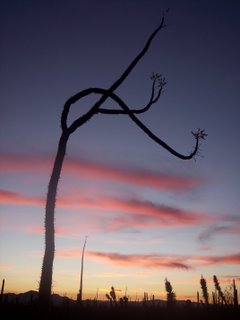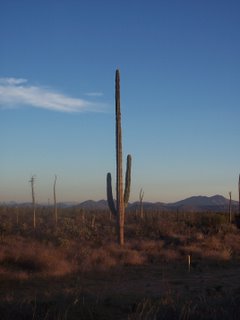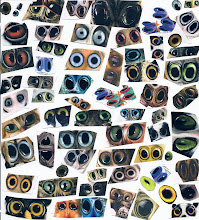A light rain awoke me during the night as I slept under the stars in the desert ghost town of San Augustine. Gathered up my gear and made my way to a rusty old cot under a small porch in the abandoned highway camp at the edge of nowhere, Baja California. In the morning I made a cup of bitter instant coffee that was left in my pannier from an MRE given to me up the line at a US Forest Service outpost while crossing the San Marcos Pass north of Santa Barbara. That day seemed like a lifetime ago as I sipped the soulless instant coffee freeze-dried for the other American boys stranded in the desert, thinking of home. Thanksgiving day, away from those I love and their bountiful feast of turkey, oyster dressing, dry white wine and dry humor. Sadness crept into my heart like a chill from a door left adjar long into the night.
Roberto, the lone occupant of San Augustine, made his way down to the abandoned highway camp to bid us a good morning. Noticing the remnants of our campfire and empty caguama from the night before he began reminiscing with us in form of slightly-comprehensible Spanish peppered with outdated English phrases gleaned from American television programming of long nights spent in the desert smoking la mota and drinking caguamas. He spoke of his home in the desert and the children and grandchildren he has not seen in years. Karl made us a bowl of oatmeal as I listened to our host and drank the cup of coffee, trying to forget the bitter taste longing. Matt was still feeling ill with Morocco Belly and declined the oatmeal and coffee.
After breakfast we packed up our dusty gear and set off for Cataviña, the only town offering fresh water and groceries within a day's ride. The 37 kilometers passed quickly through the beautiful desertscape from San Augustine to Cataviña. The brilliant colors of the desert sky were subdued in the early morning by a thin grey layer of clouds that made the ride through the otherwise scorching desert cool and plesant. Just before reaching town we stopped at a small Mad Max-like encampment, that we had mistook for Cataviña, not wanting to pass up our last chance to buy food and water for nearly 100 kilometers. A door opened to greet us revealing a hunched-over man deprived of balance and equilibrium. We offered a hearty "buenos dias" yet the man just stared straight through us for what seemed like an eternity as a long trail of snot fell from his nose through his thick, gnarled whiskers in a long sinewy band to the dusty ground by his feet.
"Donde esta Cataviña?" I prompted him. As if stung by an invisible bee he instantly came to life and responded joyfully that town was a mere two kilometers down the line. A hearty round of "adioses" and "que te viajes biens" were exchanged before we pushed on to the actual town of Cataviña - a post-apocalyptic preview which consisted of little more than an gaudy gringo-friendly hotel, an abandoned Pemex station attended to by a man selling fuel out of large greasy plastic drums, two cafes, and a small overpriced market that served as the social epicenter of the town.
At the market we ran into a couple of fellow escaped mental patients - or touring cyclists, rather - making the now cliche trip from Alaska to Argentina. They were a prudent German couple sporting slick bicycles with internally-geared hubs, fancy tear-resistent waterproof Ortlieb panniers loaded down with nearly eight liters of water and every other piece of concievable touring gear one could procure in an industrialized nation. I was most impressed with their special removable kickstands which, as they pointed out to me, also served to ward off unfriendly dogs along the road. When I asked if they had been forced to use their club on any of the overly-friendly Mexican stray dogs they looked at each othere for a moment and responed with a pensive "no."
After purchasing a two cans of beans, an avocado, a pack of flour tortillas, a caguama and a gallon of filtered water I took a seat on the dusty front stoop of the market to prepare my Thanksgiving feast. It was here that I met Baja California's answer to Howard Hughes - a famous inventor and close personal friend of both Mae West and Maralyn Monroe. He was a hard luck drifter with rotting fingernails eating a bologna sandwich on white Bimbo bread without the benefit of front teeth. How he wound up here, penniless and destitude, in the hot desert sun was not part of his canned story awaiting any English speaker willing to listen. The inventor of the bendable straw, the pop top can, the modern clothes pin, and strangely enough, training wheels never regretted his decision to be paid two cents per straw rather than the ten cents per pack he was originally offered for his ground-breaking advancement in the soda arts. That moment, as I listened to his tale of fame and fortune, woe and regret, I was a world away from home, but exactly where I needed to be.














